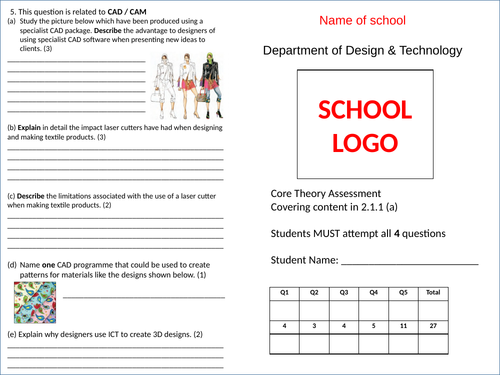52Uploads
45k+Views
38k+Downloads
Design, engineering and technology

Fibre to Fabric Revision Questions
This worksheet is for WJEC Textiles (D&T)
(a) Natural, synthetic, blended and mixed fibres
The categorisation and working properties of fibres and textiles.
The raw materials of textiles are classified according to their source.
Natural polymers
Animal polymers: wool/fleece – mohair, cashmere, angora, alpaca, camel (hair), llama.
Insect polymers: silk.
Plant polymers: cotton, linen, hemp, jute, bamboo, soya.
Manufactured polymers
Synthetic: acrylic, polyester, polypropylene, nylon (polyamide), elastane, Lycra, aramid fibres.
Regenerated: viscose, rayon, acetate, lyocell (Tencel®)
Microfibres – to include Tactel®, (Modal®).
Fibre blends
Mixed fibres
The properties of textiles fibres including, strength, elasticity, absorbency, durability, insulation, flammability, water-repellence, anti-static and resistance to acid, bleach and sunlight.

KS3 Food and Nutrition Safety Puzzle
A worksheet aimed at KS3 for a cover lesson, extension task etc.

KS3 Food and Nutrition Safety Rules
A worksheet that could be used for cover or an extension task on safety rules in the Food Technology Room.

Mock Exam Paper WJEC Design Technology Core Theory 2.1.1 (section a)
A mini mock paper that I have created to test Year 10 students on their knowledge and understanding of the core theory 2.1.1 (section a)
Free resource but please leave a review :)

Natural and Manufactured Fibres
In response to the WJEC specification:
2.1.2: (a) Natural, synthetic, blended and mixed fibres

Match the fibre to the comment
In response to the WJEC textiles specification
2.1.2: (a) Natural, synthetic, blended and mixed fibres

Sonia Delaunay Worksheet
A Sonia Delaunay worksheet which I have created as a homework task for my KS3 Year 7 class. This can also be used for a cover lesson for KS3 Art or Textiles to support the use of colour.
Students first analyse the two images above and then use blending/rendering to apply colour to the composition using warm/cool colours,

Fibres and Fabric Knowledge Organisers Textiles WJEC
The theory side of teaching GCSE DT textiles was so new to me after teaching Art Textiles for 10 years.
When delivering the theory content to the students I find that knowledge organisers distil and clarify the building blocks of learning in my subject ready to extend into the classroom learning. The don’t replace my other lesson resources but rather make it explicit what students need to know automatically to be able to apply and develop in lessons. My students use these knowledge organisers alongside worksheets and other classroom based tasks.
There are two knowledge organisers attached. Once downloaded you can change the school logo.
These knowledge organisers can be used across exam boards but focus on WJEC 2.1.2 natural, synthetic, blended and mixed fibres.

Numeracy Posters Food and Nutrition/Hospitality and Catering/Food Technology
Our school are focusing on skills this term; literacy, numeracy and DCF.
The English posters are great for my room but there weren’t any Numeracy posters so I made these three posters which have worked great.

Maurizio Anzeri Embellishment Stitch Art Textiles
This is a power-point which could be delivered over a number of lessons and with the current situation is perfect for a non-specialist classroom - all you need is needle/thread.
This was one of the first projects I delivered around 6 years ago whist teaching Art Textiles and uploaded to TES a year ago. I can believe it had over 1k downloads!
I have taken down and re-jazzed my power-point so it is more contemporary and fits in with my schools 5 principles of excellence.
This power-point includes:
Do Now Connect Task
The Big Picture
Learning Objectives
Information about Maurizio Anzeri
Models excellence and WAGOLL
Shows how the project could be developed digitally
Mini Artist Analysis
Models excellent use of analysis
Plenary Connect Activity introduces students so a second artist Hagar Vardimon
Any questions please contact me on twitter @CreativeSammie

Sonia Delaunay Mini Project KS3 Textiles Booklet
For Sept 2021-22 I have a split class at DT whereby I will be seeing Year 7 only once a fortnight on the rotation.
***Adding the PowerPoints as extra as I make them.
I have been tasked with running a mini textiles project over 6-8 lessons focusing on the techniques hand embroidery and applique.
Inspired by Sonia Delaunay’s use of colour and shape, students are going to design and make a textile greeting card. They will be given a brown kraft A6 card and envelope along with a piece of white cotton/felt. They will then use a range of coloured felt, batik, bondaweb and hand embroidery stitches to make a textile composition to decorate the front of their card.
This mini booklet is larger than it needs to be however I can set a few tasks for homework etc.
The second page is blank and that is for the marking grid.
The booklet includes a range of tasks:
Sonia Delaunay Fact File
Design Brief
Mood Board - Homework
Product Analysis
Specification and Designing
Applique and Hand Embroidery (Extension Task)
Evaluation
Glossary











